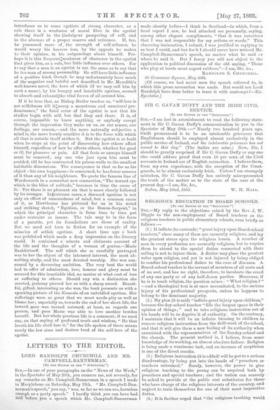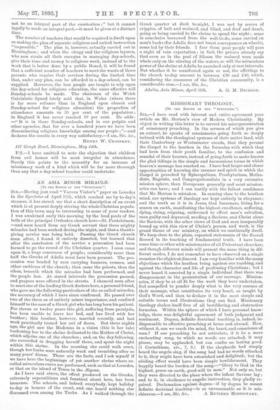RELIGIOUS EDUCATION IN BOARD SCHOOLS.
[To THE EDITOR OF THE " SplicTATOR."1 Sxn,—My reply to the objections raised by the Rev. J. W. Diggle to the non.employment of Board teachers as the religious teachers in public elementary schools, runs briefly as follows :— (1.) It inflicts (he contends) "great injury upon Board-school teachers," since many of them are earnestly religious, and lay the greatest stress upon the religious lesson. A number of men in every profession are earnestly religious, but to require them to attend to the special duties connected with their calling is not to injure them. A doctor may place the greatest value upon religion, and yet is not injured by being obliged to confine his professional duties to the cure of diseases. A. Board-school teacher is the servant of members of all sects and, of no sect, and has no right, therefore, to inculcate the creed of any one party or of any half-dozen parties. Moreover, if he is to teach religion, the question arises : "What religion P" —and a theological test is at once necessitated, to the serious injury of his professional prospects, unless he happens to belong to the dominant majority.
(2.) My plan (it is said) "inflicts great injury upon children," because the day-school teacher "fills the largest space in their opinion of things ; " and to take religious instruction out of his hands will be to deprive it of authority. On the contrary, I maintain that it will be an infinite blessing to children to remove religious instruction from the drill-work of the school, and that it will give them a new feeling of its authority when associated with the representatives of the Sunday-school and the church, The present method is, I believe, from some knowledge of its working, an almost absolute failure. Religion is being made a wearisome task, and an increase of scepticism is one of the direct results.
(3.) Religious instruction (it is added) will be put to a serious disadvantage, by being put into the hands of "preachers or teachers untrained." Surely, however, the power to give- religious teaching to the young can be acquired both by preaehers and special teachers ; and the nation can scarcely be asked to provide at the public cost substitutes for those who have charge of the religious interests of the country, and neglect to train themselves for one of their most imperative duties.
(4.) It is further urged that "the religious teaching would. not be an integral part of the curriculum ; " but it cannot legally be made an integral part,—it must be given at a distinct time.
The number of teachers that would be required is dwelt upon as making the plan of separate religious and united instruction 1` impossible." The plan is, however, actually carried out in Birmingham ; and when the clergy and the religious laymen, who now strain all their energies in managing day-schools, give their time and money to religious work, instead of to the work that is better done by a public Board, it will be found that a sufficient number of teachers to meet the wants of those parents who require their services during the limited time that, under any plan, can be afforded in a day-school, can be supplied. Moreover, the less people are taught to rely upon the day-school for religious education, the more effective will Sunday-schools be made. The chairman of the Welsh Calvinistic, Synod lately said that, in Wales (where there Is far more reliance than in England upon church and Sunday-school for religious education) the proportion of attendance amounts to 35 per cent. of the population ; in England it has never reached 10 per cent. He adds : —" It is in these Sunday-schools, and in our pulpits and other agencies, that for over a hundred years we have been disseminating religious knowledge among our people ; "—and declares the results in every way satisfactory.—I am, Sir, Sic., HENRY W. CROSSKEY.
117 Gough Road, Birmingham, May 24th.
P.S.—I have omitted to note the objection that children from evil homes will be most irregular in. attendance. Surely this points to the necessity for an increase of missionary work of a kind which will be far more thorough than any that a day-school teacher could undertake.



































 Previous page
Previous page